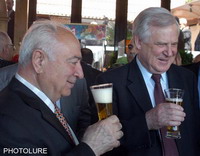Business forum reveals economic projections and promises of open investment climate
Russian leaders courted international capital and talked up the resurgent country at a business forum Saturday.

A top official seen as a potential Kremlin favorite to succeed President Vladimir Putin next year said that Russia would transform itself into a high-technology and industrial powerhouse and enter the top five world economies by 2020.
The showcase of the gathering was a multibillion-dollar deal for flag-carrier Aeroflot to buy passenger jets from U.S. planemaker Boeing, an agreement that appeared to have stalled last year amid deepening disputes between Moscow and Washington.
Putin shrugged off political tension with the West, saying that "Russia is gradually integrating with the world economy" and spotlighting burgeoning business ties.
"The very fact that you are participating in today's event is evidence that your cooperation in Russia is developing successfully. I am sure we have good prospects for the future," Putin told scores of executives from foreign corporations. On the list of attendees were the CEOs of Motorola, ConocoPhilips, PepsiCo, Siemens, and China's Sinopec.
First Deputy Prime Minister Sergei Ivanov, viewed as a front-runner in the struggle for Putin's support in the March 2008 presidential vote, said Russia was taking steps to diversify an economy heavily dependent on oil and gas exports and further open it to investment.
"Our human capital is the foundation for diversifying our economy," Ivanov said.
The two-day forum is one of the final high-profile opportunities for Putin to boast of Russia's oil-driven economic growth during his presidency and to dispel fears the nation is becoming an increasingly risky investment because of its growing political estrangement from Europe and the United States.
In recent weeks, Moscow has raised the specter of a new arms race in response to U.S. plans for a missile shield in Europe, rejected Britain's demand to extradite the suspect in the radiation poisoning of former Soviet agent Alexander Litvinenko, and increased the pressure on a BP PLC venture developing the Kovykta gas field.
Russia's benchmark RTS stock index is up just 2 percent in the past three months, the worst performer among emerging markets. That compares to a 70 percent rise in 2006, when it turned in the best performance after China.
Ivanov said the multi-billion dollar Boeing-Aeroflot deal "visibly demonstrates" foreign companies' interest in Russia. He said foreign investment in the first half of this year will reach US$60 billion (45 billion EUR). Aeroflot will acquire 22 Boeing 787 Dreamliner jets from the U.S. company, with deliveries staring in 2014.
Russian officials had said some US$3.3 billion (2.5 billion EUR) worth of deals were expected to be signed at the forum, including a US$135 million (100 million EUR) agreement with Japan's Suzuki Motor Corp. to build a car plant outside the city.
Russian news agencies said France's PSA Peugeot-Citroen signed a 250 million EUR (US$334 million) deal to build an auto plant in Russia, and Sweden's AB Volvo agreed to invest 100 EUR (US$134 million) in a factory to produce 15,000 trucks a year.
Ivanov sought to allay fears that Russia was taking a more authoritarian path under Putin, who has been criticized for muzzling the media and backtracking on democracy.
"What will Russia be like in 2020? It will be democratic, based on the rule of law, and it will respect the rights of individual," he said.
Across town, a protest march led by chess great Garry Kasparov and other Kremlin foes ended peacefully - a contrast to previous protests that have been violently broken up by truncheon-wielding police, drawing Western criticism.
Ivanov also predicted Russia would control at least 10 percent of world production in nuclear energy, aviation, space industry, shipbuilding, software and nanotechnology. While Russia is creating state holding companies to oversee these sectors, they would work in close cooperation with foreign corporations, he said.
The former defense minister is now in charge of industry and technology, a portfolio he is using to grab the spotlight before the presidential election. The popular Putin is constitutionally barred from a third straight term.
Finance Minister Alexei Kudrin warned against expanding state subsidies.
"State support for various (industrial) sectors isn't consistent with their success, especially in areas of modern technology," Kudrin said. He said the level of state subsidies in the national economy was still higher proportionately than in the U.S. or other developed economies, even after over a decade of economic reform.
Former World Bank chief James Wolfensohn welcomed Ivanov's pledges.
"To many of us, the Kremlin still looks like an unapproachable place, but the strides you are making in terms of opening up have been tremendous," he said.
The scale of the forum reflected a desire to make an impression. Organizers raised the forum's budget nearly 70 percent to 500 million rubles (US$19 million; 14 million EUR) this year, and an exhibition center on the Gulf of Finland was expanded for the occasion.
Subscribe to Pravda.Ru Telegram channel, Facebook, RSS!




